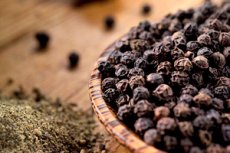Medical expert of the article
New publications
Black pepper peas for diarrhea
Last reviewed: 30.06.2025

All iLive content is medically reviewed or fact checked to ensure as much factual accuracy as possible.
We have strict sourcing guidelines and only link to reputable media sites, academic research institutions and, whenever possible, medically peer reviewed studies. Note that the numbers in parentheses ([1], [2], etc.) are clickable links to these studies.
If you feel that any of our content is inaccurate, out-of-date, or otherwise questionable, please select it and press Ctrl + Enter.

Black pepper peas - dried bones (fruits) of the tropical evergreen liana Piper nigrum L., native to the southern regions of India, are used worldwide as a spice. But since ancient times in Ayurvedic medicine, black pepper has been used to improve digestion and treat gastrointestinal disorders. And the answer to the question of whether black pepper peas help with diarrhea is affirmative: they do.
Why does black pepper peas help with diarrhea?
The chemical composition of Piper nigrum L. Fruits has been studied in detail, and it includes various biologically active compounds that exhibit a wide range of pharmacological action: alkaloids, amides, phenolic compounds (quercetin and kaempferol) and phenolic acids (hydroxybenzoic and hydroxycinnamic acids), lignans, steroids. [1]
Black pepper contains up to 9% essential oil, which contains terpenes and terpenoids such as camphene, β-caryophyllene, limonene, α- and β-pinene, and linalool sabinene that can protect cells from inflammation and damage.
But in how black pepper peas act from diarrhea, the main role is played by the alkaloid piperine, which gives it a characteristic flavor and spiciness. In the fruit of black pepper, piperine, as well as its isomers (isopiperine, chavicin, isohavicin) contains 2-9%.
Piperine exerts an antispasmodic effect, the mechanism of which researchers attribute to a decrease in intracellular calcium (Ca2+) concentration in smooth muscle.
But the antisecretory effect of Piper nigrum was found to be due to inhibition of the transmembrane conductance regulator (CFTR), an epithelial conduction channel for the main anion of extracellular fluid - chloride (Cl-), and also to a decrease in chloride secretion in enterocytes (intestinal epithelial cells that control the excretion and absorption of electrolytes), which leads to suppression of fluid accumulation in the intestine during diarrhea. [2]
Black pepper, also known in Ayurveda as kalimirch (kalimirh), maricha or katuka, can stimulate the release of pancreatic enzymes, aiding in the digestion of fats and carbohydrates, and also has vetrogonic properties, meaning it alleviates flatulence and other digestive problems. [3]
Piperine also gives black pepper strong anti-inflammatory properties, which is helped by the spicy oleosmoles consisting of various chemical compounds that have an antioxidant effect (reduce oxidative stress of cells).
In addition, two compounds, 3,4-dihydroxyphenylethanolglucoside and 3,4-dihydroxy-6-(N-ethylamino) benzamide, have been identified in black pepper that inhibit the growth of intestinal pathogens such as Escherichia coli, Bacillus cereus and Salmonella typhimurium. [4]
How to take black peppercorn pepper for diarrhea?
In vitro and in vivo animal studies have shown that, depending on the dosage, black pepper piperine exhibits antidiarrheal and antispasmodic effects (similar to the drug loperamide ) at a dose of 10 mg per kg of body weight.
But we do not know how much of this alkaloid is contained in one knuckle of Piper nigrum, so the question remains: black pepper peas from diarrhea how many pieces to take?
It is recommended to take 10-12 peas whole (with water) during or immediately after a meal.
Folk recipes with pepper for diarrhea are given in the publication - herbs for diarrhea.

